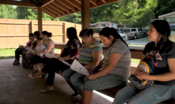author
2,170 Results
article
Our Spring Webinars Are All About Equity
Mark your calendar! These free PD opportunities, about 45 minutes each, will address topics like home visits, implicit bias and building empathy. We’ll also embark on part two of our popular Black Lives Matter discussion.
text
Informational
An Ex-Slaveholder's View of the Negro Question in the South
Written in 1900, this text presents the views of a former enslaver about the value of slavery for those enslaved.
December 14, 2017
text
Informational
I Investigate Lynchings
Undercover, Walter White investigates an African-American woman's lynching in a rural Georgia town. White uses his Southern accent to keep suspicion at bay during a conversation with a general manager, whom he believes to be the lynch-mob leader.
October 30, 2014
text
Informational
The Negro's Place in World Reorganization
This essay introduces the Universal Negro Improvement Association and some of its core beliefs, such as the idea that all African-descended people should work together to achieve preservation and independce from whites at home and abroad, particularly in Africa.
July 3, 2014
article
Teaching in Solidarity

The guiding principles behind the Black Lives Matter At School Week of Action can be an important frame through which to reimagine more liberatory educational spaces for Black children.
text
Literature
Yet Do I Marvel
The poem deals with the awesome and awful power of God in relation to the challenging lives of humans and animals.
February 21, 2019
text
Informational
Petition of 1788 for the Abolition of Slavery in Connecticut, by Enslaved People of New Haven
This petition illustrates how enslaved people used the rhetoric of the American Revolution to point out the colonies’ hypocrisy of demanding freedom and liberty, while themselves having slavery.
January 5, 2018
text
Multimedia
In a trailer park, isolated mothers pursue a shared dream

“Zindy is a Mexican immigrant and domestic abuse survivor who lives with her five children at an isolated Atlanta-area trailer park. She notices that other park residents — immigrants from Mexico and Central America — struggle with the same issues she does, such as English fluency, reluctance to trust others, and limited access to education and other services. Zindy views their shared isolation as an opportunity and unites mothers in the community with similar cultural norms and practices — not to address shared problems, like domestic abuse, but to realize their common dreams for their children. This is the story of how they forged cultural ties and mutual trust, and the confidence to seek outside help in creating an escuelita (“little school”).”
June 27, 2019
text
Literature
Tomorrow Night
Bibi and her family escape their plantation and journey to a better life.
February 19, 2020